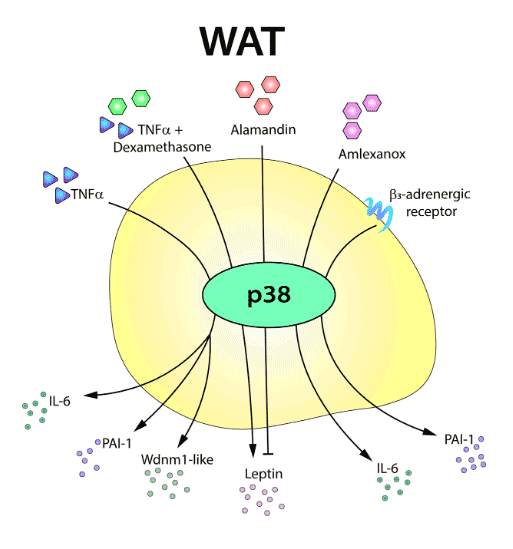El domingo 27 de febrero, Guadalupe Sabio participó en la sección Vida Sana dirigida por Julio Basulto.
Tag: white adipose tissue (Page 4 of 8)
Magdalena Leiva, Nuria Matesanz, Marta Pulgarín-Alfaro, Ivana Nikolić & Guadalupe Sabio.
The complex functions of adipose tissue have been a focus of research interest over the past twenty years. Adipose tissue is not only the main energy storage depot, but also one of the largest endocrine organs in the body and carries out crucial metabolic functions. Moreover, brown and beige adipose depots are major sites of energy expenditure through the activation of adaptive, non-shivering thermogenesis.
In recent years, numerous signaling molecules and pathways have emerged as critical regulators of adipose tissue, in both homeostasis and obesity-related disease. Among the best characterized are members of the p38 kinase family. The activity of these kinases has emerged as a key contributor to the biology of the white and brown adipose tissues, and their modulation could provide new therapeutic approaches against obesity.
Here, we give an overview of the roles of the distinct p38 family members in adipose tissue, focusing on their actions in adipogenesis, thermogenic activity, and secretory function.
Elisa Manieri, Leticia Herrera-Melle, Alfonso Mora, Antonia Tomás-Loba, Luis Leiva-Vega, Delia I. Fernández, Elena Rodríguez, Laura Morán, Lourdes Hernández-Cosido, Jorge L. Torres, Luisa M. Seoane, Francisco Javier Cubero, Miguel Marcos & Guadalupe Sabio.
Hepatocellular carcinoma (HCC) is the sixth most common cancer type and the fourth leading cause of cancer-related death. This cancer appears with higher incidence in men and during obesity; however, the specific mechanisms underlying this correlation are unknown.
Adipose tissue, a key organ in metabolic syndrome, shows evident gender disparities in the production of adipokines. Levels of the important adipokine adiponectin decrease in men during puberty, as well as in the obese state. Here, we show that this decrease in adiponectin levels is responsible for the increased liver cancer risk in males. We found that testosterone activates the protein JNK in mouse and human adipocytes. JNK-mediated inhibition of adiponectin secretion increases liver cancer cell proliferation, since adiponectin protects against liver cancer development through the activation of AMP-activated protein kinase (AMPK) and p38α.
This study provides insight into adipose tissue to liver crosstalk and its gender relation during cancer development, having the potential to guide strategies for new cancer therapeutics







